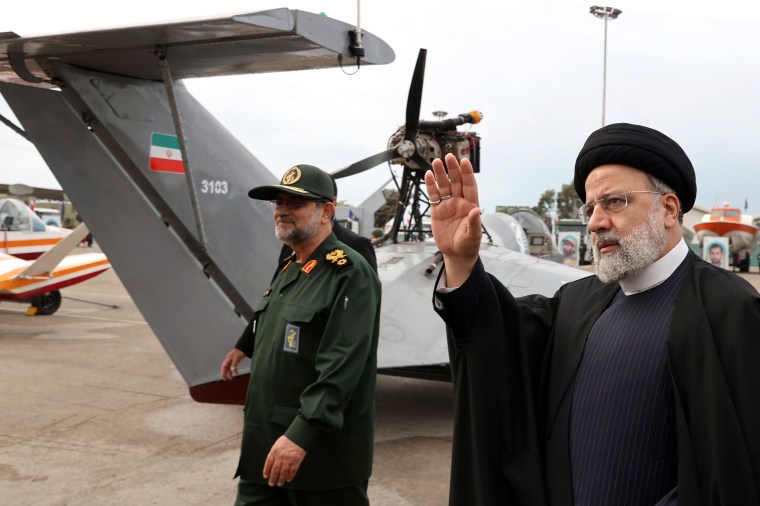
A network of militant groups backed by Iran — the self-styled “Axis of Resistance” — has been launching attacks against Israel, the U.S. and international shipping, which the militants say is a protest against Israel’s war and in support of the Palestinians. As part of this so-called axis, powerful Iran-backed militants have stepped up attacks against American forces across the Middle East, stationed there following the Syrian civil war and the military campaign against ISIS.
There have been more than 160 attacks by these groups across Syria and Iraq, wounding American soldiers, including some who have suffered brain injuries. Then last week, a drone attack on a U.S. base in Jordan killed three American service members — prompting President Joe Biden to vow a forceful, multistage response, while simultaneously trying to avoid direct war with Iran.
This came Friday night in the form of some 85 strikes against targets in Iraq and Syria linked either to Iranian militias or Iran’s powerful Islamic Revolutionary Guard Corps, the IRGC, which is in Syria supporting President Bashar Assad.
The heavily trailed U.S. operation gave ample time for Iranian military commanders and their allies to hunker down. A senior Iraqi official told NBC News on Wednesday that they had vacated sensitive sites and moved weapons.
“We are not trying to send a signal to anyone other than those who mean Americans harm,” Lt. Gen. Douglas A. Sims II, director of operations of the Joint Staff, told journalists Friday.
Nonetheless some analysts did not see the strikes as a significant step up in any U.S. effort at deterrence.
They appeared to be “different in terms of power, number of targets, and use of not only airstrikes but also cyberoperations. There could also be covert action elements that we don’t know about,” said Jason Brodsky, the policy director of the Washington-based group United Against Nuclear Iran. But, he added in a post on X, “nothing that’s public suggests to me anything of significant strategic value that was hit. While the quantity of targets may have increased, the quality has more or less stayed the same.”
Experts say the advance warning may partly have been to give Iran and its proxies a bloody nose without triggering an escalatory response, especially in Iraq, where the U.S. has important bases and is trying to maintain ties to a Shiite-led government that is also close to Iran.
Regardless, Iraq’s response was scathing, setting up a verbal conflict between Washington and Baghdad, a government that still hosts U.S. troops following the 2003 invasion and subsequent fight against ISIS.

The U.S. said it had warned Iraq in advance of the airstrikes, something Iraq denied while accusing Washington of killing 16 people in the country, including civilians, and having “deliberately deceived and falsified the facts.”
The senior U.S. administration official told NBC News this was not true. “It wasn’t a huge heads up,” the official said, which they said was to be expected given Iraq’s relationship with Iranian-backed militias in the country. “But it is not accurate to say they weren’t informed. Iraq is a sovereign nation and we respect their right to express their concerns, but then they shouldn’t harbor these Iranian groups on Iraqi soil.”
In Syria, the Syrian Observatory for Human Rights, a Britain-based watchdog, said 23 people had been killed.
The current relationship between Iraq and Iran is a complex one, with Iraq politically dependent on the powerful, Iran-backed militias based there, but at the same time hosting the American troops.
One of the most powerful of these militias, Kataib Hezbollah, has its “footprints” on the deadly attack against U.S. forces in Jordan, the Pentagon said. Kataib Hezbollah said last week it would pause attacks against Americans in the region because it did not want to cause embarrassment for the Iraqi government, which had called on all sides for calm.
But on Saturday, the militants hinted that this may yet change, posting a video to the Telegram messaging service quoting its military spokesman Jaafar al-Husseini, interviewed last month.
“The Americans will see days they will never forget throughout history,” he said.
Keir Simmons and Mo Abbas reported from Erbil, and Alex Smith from London.
 Latest Breaking News Online News Portal
Latest Breaking News Online News Portal








